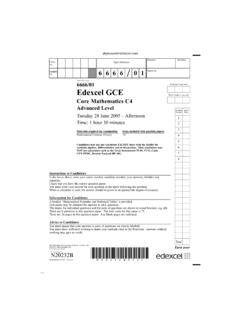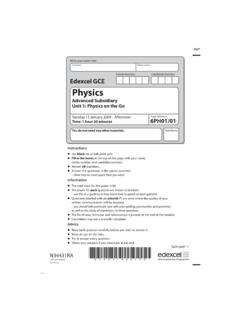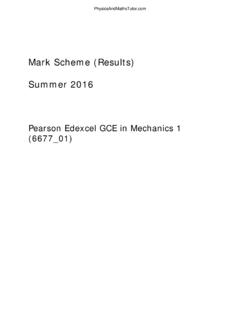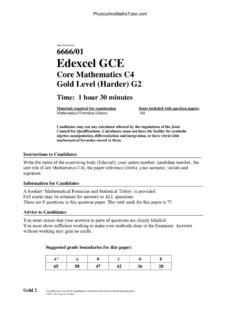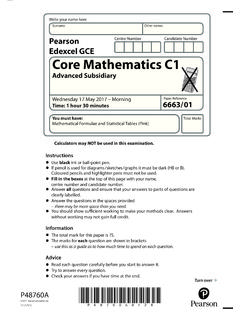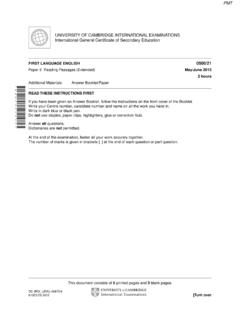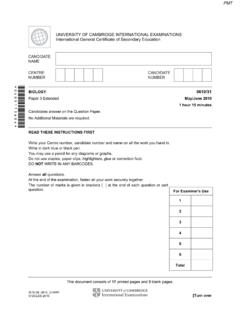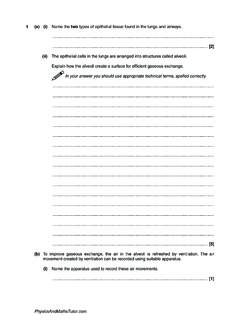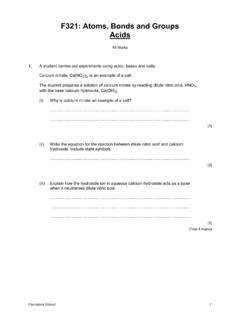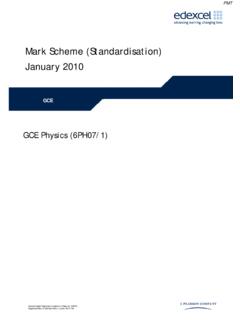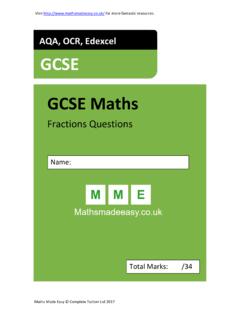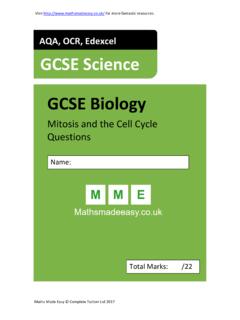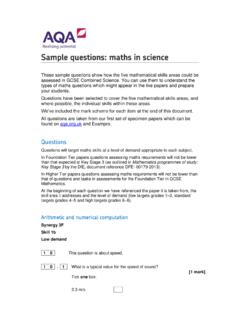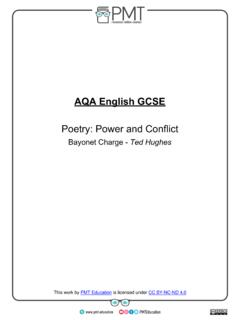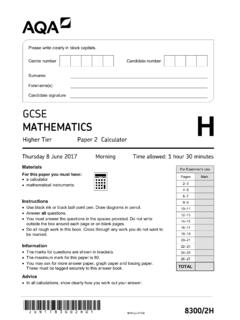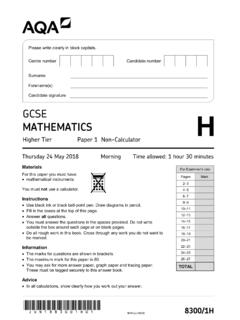Transcription of AQA English GCSE Poetry: Power and Conflict
1 AQA English gcse Poetry: Power and Conflict The Prelude - William Wordsworth PRELUDE William Wordsworth Brief Summary The extract explored during gcse of The Prelude is actually from an epic poem comprising of fourteen books, of which the extract is produced from the first book Introduction and school-time , very close to the start. The poem centres on Wordsworth s childhood memory in the Lake District where he steals a boat and rows it into the middle of a lake. A mountain by the lake grows far bigger than he thought it. He realises the monumental nature of the mountain and hurries back to shore, claiming that the experience has changed how he sees nature. Synopsis Steals a boat and rows out onto the lake Watches ripples as he easily rows whilst focusing on a fixed point Starts to see the mountain grow bigger than he thought it was Realises the immensity of the mountain and of nature Scared and starts to row back to the shore Haunted by the event for days after Has changed how he views nature and how he views humanity Context William Wordsworth (1770 - 1850) Wordsworth was born in Cumberland in the Lake District.
2 He had a difficult childhood as he had a troubled relationship with his father and other relatives. Both his parents died during his adolescence and, as a result, he was split up from his siblings and sent to live with different relatives. He spent a lot of time avoiding his mother s family, who treated him so badly he considered suicide. He developed a deep affection for the Lake District as he spent so much time outside to escape his problems. Wordsworth was a romantic poet , which meant he was in favour of resisting growing industrialism by remembering a simpler, natural past. The changing shape of industrial Britain is likely the force that inspired him to explore his own moral and spiritual development through the medium of his epic poem The Prelude.
3 The poem also comes with a message of warning to the contemporary society that was transforming fields to factories, woods to roads . He was also an early supporter of the French revolution, like many romantic poets, who supported attempts to overthrow institutions. Their aim was to bring democracy and equality instead of monarchs and established religion to England. However, in general the romantic movement later lost support for the revolution when it turned violent, seeing it as evidence of humanity s innate evil. The poet s aim was to write a three part autobiographical epic called The Recluse , with The Prelude being the first volume of 400 pages. He wanted to present ideas from his past then explore their philosophical significance through the medium of nature and society, but sadly died before its completion.
4 Romantic Movement Romanticism stemmed from the enlightenment period which focused on objective science, logic and rationality. Writers at the time wanted to reject the cold unemotional rationalism of the enlightenment and instead use a more emotional and subjective view of the world. They looked to the beauty of nature and past life in order to protest against the changing face of the world which was happening due to industrialisation. The romantic writers would also follow enlightened values of protesting institutions and sources of Power (church / monarch / army), and use their work to comment on society and how it should be reformed . They tended to use everyday language to make poems accessible to all.
5 The period can be considered a r eaction to the industrial revolution , as writers often expressed their dislike of urban life. As Wordsworth was a romantic poet, this means he wished to write literature which challenged people s preconceptions and viewpoints at the time. Context of the Prelude The Prelude was intended as the prologue to The Recluse , designed to be a three part epic poem, which he died never finishing. The fact he never managed to finish this work, which he wanted to rival Milton s Paradise Lost , plagued him greatly according to letters. Prelude The main Conflict explored in the poem is that of between nature and humans, or man vs nature , and is investigated through a young man s attempt to control nature through his stolen rowing boat.
6 The piece is written in iambic pentameter to keep a constant rhythm which to contrast the revelatory events which occur to the young man in this section of the poem. The poem is based on Wordsworth s childhood , during an event which happened in the Lake District, which brings a tone of realism to the piece. This is obviously a formative event in his life. The setting of the poem in a boat, on a journey, could metaphorically relate to the spiritual journey the speaker is taking in realising the true extent of nature. This introduces both the reader and speaker to the theme of reflection. Extract from, The Prelude Wordsworth puts in a lot of description about how he steals the boat.
7 Could be considered an attempt to romanticize, in order to defend his actions or mitigate their moral detriment. Continues to refer to nature using the pronoun her which could suggest he views himself as equals with nature, which later becomes his downfall when he realizes the true Power of nature. One summer evening (led by her) I found A little boat tied to a willow tree Within a rocky cove, its usual home. Straight I unloosed her chain, and stepping in Pushed from the shore. It was an act of stealth And troubled pleasure , nor without the voice Of mountain-echoes did my boat move on; Leaving behind her still, on either side, Small circles glittering idly in the moon, Until they melted all into one track Of sparkling light.
8 But now, like one who rows, Proud of his skill , to reach a chosen point With an unswerving line , I fixed my view Upon the summit of a craggy ridge, The horizon s utmost boundary; far above Was nothing but the stars and the grey sky. She was an elfin pinnace; lustily I dipped my oars into the silent lake, And, as I rose upon the stroke, my boat Went heaving through the water like a swan; Can be considered an allusion to the idea of Mother Nature, and nature can be seen as female in that it is responsible for the feminine task of creating, sustaining and nurturing life just as a mother does. By using personification, Wordsworth is able to contrast the role of nature to the role of a human whilst women nurture a single child; nature nurtures an entire planet thus demonstrating its superior Power .
9 Oxymoronic phrase shows he knows he has no right to be stealing the boat but feels entitled to enjoy nature, and arrogance of believing he was in control he is a representation of humanity humanity's pride in its importance and ability Still fixed in a narrow field of vision, he viewed mankind as united with nature working together with humanity as the dominant Power , thus enabling him to manipulate water to his benefit and control his journey to a chosen point . Nature provides a comforting unity when the speaker tries to work with it. thinks he controls where he is going despite being led by nature. Deceived into a sense of control, but nature chose the point as a destination where he would be humbled.
10 This has the larger suggestion that it is only when mankind tries to work against nature that it becomes arduous and laborious The active verb heaving connotes sustained, intense physical effort. The illusion of control is broken as the mountain rises from the water, and nature s supremacy becomes apparent Mountain seems to be living with intent wanted to reveal itself. This phrase also suggests the reader can empathise with the speaker s fear and anxiety, and it juxtaposes to how nature was working with him at first, but now has turned against him. Mirrors his actions earlier in the poem when he initially decides to steal the boat he uses to go and see the mountain - but he has now reversed roles with nature.
